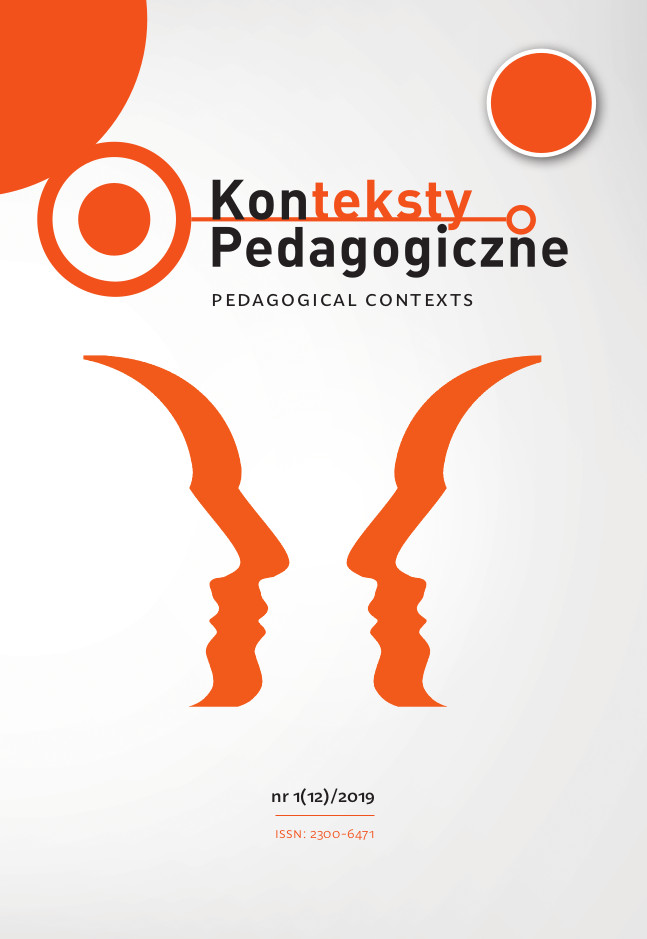Abstract
The study was to determine the correlation between the level of antisocial behaviors and the sense of identification with selected educational environments in the group of socially maladjusted youth. A total of 481 residents of Youth Educational Centers participated in the study. The focus was on the sense of identification with the chosen educational environments in the context of manifested antisocial behaviors. It turned out that, regardless of the intensity of antisocial behaviors, the sense of familial identification is always equally strong. In the case of the sense of identification with a peer group, a certain regularity can be observed. The higher the intensity level of antisocial behavior, the stronger the sense of peer identification. However, when the sense of identification with school is strong, the intensity of antisocial behaviors decreases.
References
Bańka, A. (2002). Społeczna psychologia środowiskowa [Social Environmental Psychology]. Warszawa: SCHOLAR.
Bębas, S. (ed.). (2011). Oblicza patologii społecznych [The Faces of Social Pathology]. Radom: Wyższa Szkoła Handlowa.
Bronfenbrenner, U. (1976a). Ekologische Sozialisationsforschung [Research on Ecological Socialisation]. Stuttgart: Klett-Cotta.
Bronfenbrenner, U. (1976b). Ekologia rozwoju człowieka. Historia i perspektywy [The ecology of human development: History and perspectives]. Psychologia Wychowawcza 5, 537-549.
Bronfenbrenner, U. (1979). The Ecology of Human Development. Cambridge: Harvard Univeristy Press.
Bronfenbrenner, U. (1988). Dwa światy wychowania. USA i ZSRR [Two Worlds of Childhood. U.S. and U.S.S.R.], transl. J. Banasiak. Warszawa: PWN.
Brzezińska, A. (2000). Społeczna psychologia rozwoju [Social Developmental Psychology]. Warszawa: SCHOLAR.
Brzeziński, J. (2004). Metodologia badań psychologicznych [Methodology of Psychological Research]. Warszawa: PWN.
Czapów, C. (1993). Grupy rówieśnicze [Peer groups]. In: W. Pomykało (ed.), Encyklopedia pedagogiczna [Pedagogical Encyclopedia]. Warszawa: Fundacja Innowacja. pp. 220-223.
Dubois, B.and Krogsrud, K.M. (1999). Pracasocjalna. Zawód, który dodaje sił [Social Work: An Empowering Profession], transl. K. Czekaj. Katowice: Wydawnictwo Śląsk.
Garbarino, J. (ed.). (1992). Children and Families in the Social Environment. New York: Aldine de Gruyter.
Izdebska, J. (2000). Dziecko w rodzinie u progu XXI wieku. Niepokoje i nadzieje [The Child in the Family at the Beginning of the 21st Century. Concerns and Hopes]. Białystok: Trans Humana.
Jarymowicz, M. (ed.). (1994, 2002). Poza egocentryczną perspektywą widzenia siebie i świata [Beyond Egocentric Perspective in Self-Perception]. Warszawa: Wydawnictwo IP PAN.
Kemp, S., Whittaker, I.K. and Tracy, E.M. (1997). Person – environment practice. The social ecology of interpersonal helping. New York: Aldine de Gruyter.
Kłoskowska, A. (2012). Kultury narodowe u korzeni [National Cultures at the Grass-root Level]. Warszawa: PWN.
Kuć, M. (2010). Kryminologia [Criminology]. Warszawa: C.H. Beck.
Muszyński, H. (2005). Zarys teorii wychowania [The Theory of Upbringing. An Outline]. Warszawa: PWN.
Payne, D. and Cornwell, B. (2007). Reconsidering Peer Influences on Delinquency: Do Less Proximate Contacts Matter? Journal of Quantitative Criminology 23, 127–149.
Pospiszyl, K. and Żabczyńska, E. (1981). Psychologia dziecka niedostosowanego społecznie [Psychology of the Socially Maladjusted Child]. Warszawa: PWN.
Szczepański, J. (1970) Elementarne pojęcia socjologii [Elementary Concepts in Sociology]. Warszawa: PWN.
Theiss, W. (1996). Trudności i zagrożenia w funkcjonowaniu środowisk wychowawczych współczesnej Polski [Difficulties and threats in the functioning of educational environments in contemporary Poland]. In: K. Franczak and and J. Niewęgłowski (eds.), Wychowanie wobec zachodzących przemian [Upbringing in the Face of Current Changes]. Warszawa: SIWCH, pp. 8-18
In accordance with the recommendation of the Ministry of Science and Higher Education, which aims to counteract the practice of “ghostwriting” and “guest authorship,” all authors submitting their text for publication should attach an author’s statement which declares the contribution of each of the authors to the article. The printed and signed statement should be delivered by mail or other means to editor-in-chief Joanna Skibska or sent in the form of a scan to the following e-mail address: redakcja@kontekstypedagogczne.pl. The authors will not receive remuneration for publishing their papers. The editors reserve the right to make minor editorial changes to the articles which will not affect the substance of the article. We encourage all authors to prepare their articles in accordance with the guidelines for manuscript preparation. Download pdf file.
Authors transfer all copyrights and grant the journal the right of first publication with the work simultaneously licensed under a Creative Commons Attribution License that allows others to share the work with acknowledgement of the work's authorship and initial publication in this journal. All authors agree to the publishing of their email addresses, affiliations and short bio statements with their articles during the submission process.

